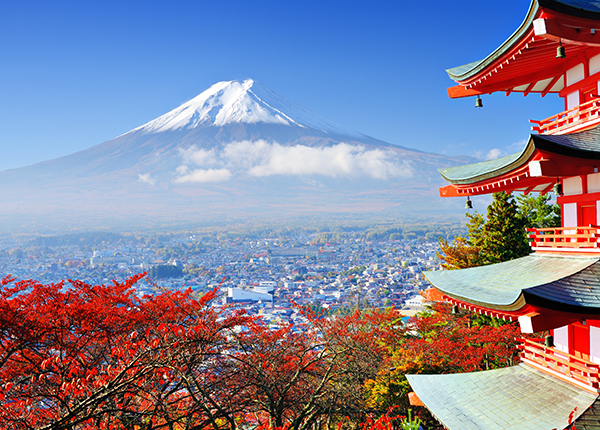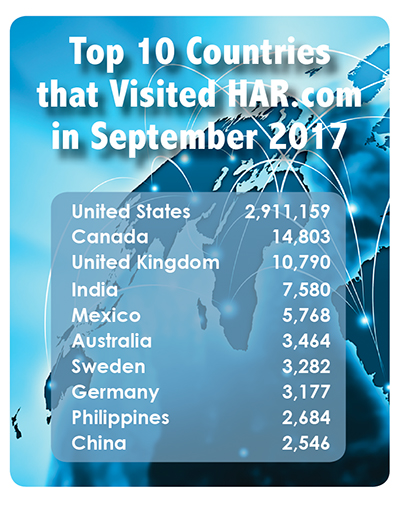First published in 2013 in the NAR Global Perspectives magazine
One of the top twenty countries who visits HAR.com monthly is Japan. Below is an article from the NAR Global Perspectives newsletter from 2013 but a lot of the information remains true today.
Based on a 2004 census update, 1.2 million people of Japanese descent live in the United States, up 4 percent from 2000. Among this group, about 58 percent were born here. Of the remaining 42 percent, about 137,000 have become naturalized U.S. citizens and 363,000 remain Japan-born non-citizens.
Large communities have existed on the West Coast for many generations, making Japanese-Americans the most acculturated group among Asian immigrants.
Recently, communities have formed in less likely areas, like Alabama and other Southern states, as corporations like Toyota, Nissan and Honda have built numerous U.S. manufacturing facilities. The Japanese have also invested heavily in U.S. real estate and rental leasing, accounting for 13.3 percent of $52 billion invested by foreigners in 2008.
Reaching out locally
To identify local contacts, look for Japanese cultural associations, community organizations and a Japanese-American Chamber of Commerce in your area. A good place to start is the National Association of Japan-America Societies. Use this site to locate a chapter in your area or state, and find links to cultural events and programs at which you can network. Wherever there is a sizable Japanese American community, you will likely find a Japan-American Society. Twenty-six states have them; Texas has four, and Colorado two.
Also consider arranging a trip to Japan to meet potential investors and transferring executives. Your local Japan-America Society probably has experience setting up trade missions to Japan, and may have trips in the planning stages. Don’t forget to contact NAR’s Global Business and Alliances group for more help.
Learn more about the culture
Culture guides the way people interpret the behavior of others. It can become a barrier between an agent and a foreign buyer, unless the agent understands where potential pitfalls lie.
Be particularly attuned to social practices, communication styles, including body language and gestures, and business practices. It’s best to learn as much as possible prior to your first meeting.
Luckily, many very good resources that address the challenges of doing business across cultures can be found online. (See sidebar.) NAR’s Field Guide to Business Etiquette When Working with Other Cultures has a collection of articles on cross-cultural dealing that can be found at realtor.org/library/library/fg225.
Japanese social practices
In general, the Japanese conduct business with more formality than do Westerners. Americans’ casual style of language, dress, and humor may not create a good first impression with Japanese buyers.
Traditionally, Japanese are formal in their business conduct and adhere to well-recognized protocols. “In a first meeting, a Japanese buyer can appear to be very quiet, even shy by American standards,” says Jason Watabe, ABR, CIPS, CRS, at John L. Scott Real Estate in Mercer Island, WA, and NAR’s President’s Liaison to Japan. “It’s very important to be polite and have a humble demeanor. Being bold can be construed as being boastful.”
Introductions can be a blend of East meets West, bowing while shaking hands. To make a good first impression, practice this in front of a mirror to avoid feeling awkward when the occasion arises.
One way to convey humility is to respectfully ask a client how they would like to be addressed. Some people may prefer a first-name basis while doing business in the U.S., others may not. “It’s dangerous to make assumptions in social matters. Asking helps you get it right, and demonstrates humility and service,” notes Watabe.
Should you give a gift?
Gift giving is common in Japan, but it is not necessarily expected during a first business meeting held in the United States. If you do bring a gift, make sure it is an appropriate gesture. “I will always bring a small gift, but that is customary in Hawaii,” says Judy Sykes, CIPS, CRB, CRS, GRI, SRES at Sykes and Sykes Properties in Honolulu, Hawaii.
A small gift that is somehow representative of your area would be a meaningful gesture. “An expensive gift would be out of place in an initial meeting,” she adds, “because it signals high expectations and a sense that a debt is owed.”
Language and communication challenges
Early in the first meeting you will want to determine your client’s comfort level with English. Watabe recommends a direct but polite approach, “Do you understand English well? Do you feel comfortable speaking it?” If they don’t, it’s time to bring in a translator such as a relative. Stop at many points throughout your meeting to ask if they understand what you mean.
Always speak proper English and avoid colloquialisms, as they are easy to misinterpret. Do not use slang. It may be unfamiliar to your client, and it conveys a sense of casualness that is not appropriate.
Nonverbal communication is very important. Unlike in America, long periods of silence are common in meetings in Japan, and allow the participants time to think over what has been said. Become comfortable with silence and do not make idle conversation to fill it.
Differences in real estate practices
A real estate transaction in the U.S. has little in common with one conducted in Japan. As a result, a Japanese national who is buying for the first time in the U.S. may find the process so unfamiliar that they will not know what to ask. Here are important differences to be aware of:
- Japan uses the metric system.Know how to make conversions to square meters and hectares. The easiest way to do this is by downloading a metric conversion application for your phone.
- Title insurance and escrow don’t exist in Japan.Take time explaining them to your client. If possible, give your buyer written information on these topics. Japanese buyers often understand written English better than spoken.
- Japan does not have an MLS.Explain the MLS to your client, stressing that you as their REALTOR® have access to all listings in the area. In Japan, buyers go to many brokers to cover their market. Helping them understand the MLS will reduce the chances of them doing so here.
- Showings are different in Japan.There, floor plans are always available, and your clients will expect them. Tell them prior to showing that this is not customary in U.S. transactions. Property boundaries are also very important within Japanese culture, and a client may ask to walk them. Do not take boundary questions lightly.
Cover these issues in the initial meeting to ensure that they don’t cause confusion later. Don’t be afraid to ask your clients repeatedly if they understand. Wherever possible, provide written information. Watabe uses a flow chart written in both Japanese and English to map out the process. He points out that “if you don’t explain a step in the transaction, they won’t ask, because they don’t know about it.”
Reading signals
A single gesture can have different meanings on either side of the table. A nod, indicating agreement and positive intent in Western cultures, may be no more than a polite acknowledgement coming from a Japanese buyer. In fact, they may disagree with what you’re saying, but are acting polite by not telling you so. “Nods have subtle meanings and may be misread,” says Sykes. “You may think you’ve closed the deal. Then you won’t hear from them again, and you won’t know why.”
Sykes says it is important to take your cues from the client. Do not presume to get too friendly until they do so themselves. However, show that you’re working hard for them and they will appreciate it. Earning trust is important, and you may have to go beyond what you’re used to doing for other clients. “Give them your full attention when they are here on business,” says Sykes. “Work very hard for them, and they will forgive most cultural details you might get wrong.”
Where to learn more
No matter which immigrant group is of greatest interest to you, investigate NAR’s Global Alliances at realtor.org/global_alliances to pinpoint additional contacts and groups that can help you learn more and establish important connections. Look up the President’s Liaison and Ambassador Association for a given country.
Did you know?
- About 60 percent of Japanese descendants in the U.S. are homeowners
- As a group, their median household income is nearly $54,000
- The median value of their homes = $336,882
Source: 2004 U.S. Census Update



